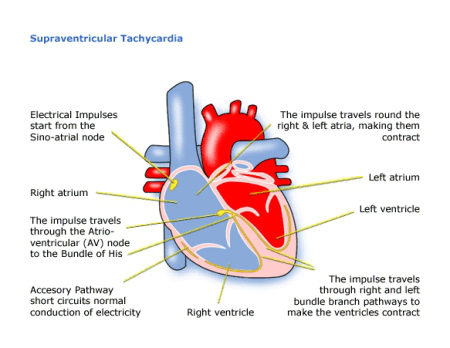What is a heart palpitation?
Heart palpitation is the feeling a person has that the heart is beating fast or irregularly. Sometimes children report a missing heart beat feeling (lasting for only a second or a few seconds) or the feeling that the heart is beating faster (and sometimes stronger) than it should in conditions of complete rest. Less commonly, children complain of a fast heart when they are exercising or the heart rate remaining high even after exercise has stopped.
What causes palpitation?
Heart palpitations are very common in children and are generally not associated with heart problems or congenital heart defects. Common causes of palpitations are emotional stress and anxiety, significant physical deconditioning (being not physically fit), asthma medications, fizzy drinks and other foods or drinks with caffeine. Young children often report palpitations as chest pain as they are not able to describe their complaint with appropriate words. In some rare cases, palpitations can be the sign of an underlying medical condition such as thyroid gland problems, low haemoglobin level in the blood (anaemia) or cardiac arrhythmias (abnormal heart rhythm, most commonly associated with a fast heart rate and due to a problem with the electrical system of the heart).
What to do if I have palpitations?
Palpitations are generally self-limiting events. However, if palpitations are associated with chest pain, dizziness, lightheaded feeling or true fainting, sweating, paleness and vomiting or difficulty in breathing then they might indicate an underlying cardiac problem. If these symptoms are present, an appointment with your primary care physician or your paediatrician should be booked straight away. A medical opinion should also be sought if you child has palpitations and you have a family history of arrhythmias or heart muscle disease (cardiomyopathy, congestive cardiac failure, or sudden unexpected death). If your child is complaining of palpitations that are followed by fainting or he/she looks non responsive or if he/she looks progressively more pale, sweaty and tired/breathless you should call the emergency medical services immediately (999 in London and the UK).
How to investigate the cause of palpitations?
If your paediatrician is unsure about the cause of palpitations or is concerned by it, your child will be referred to a paediatric cardiologist who will be able to identify the cause of the symptoms. By the time you are referred, your paediatrician will have performed investigations to exclude non cardiac causes (blood tests). The paediatric cardiologist will be very interested in the circumstances in which the palpitations occur, what triggers them, how often and for how long they occur. For this reason it is important to keep a written record in a diary of the number, duration and symptoms associated with the palpitations. The paediatric cardiologist will perform an ECG (a recording of the electrical activity of your child’s heart) and an echocardiogram (a detailed ultrasound scan of the heart) in order to confirm that the heart is built and functions normally. The paediatric cardiologist might request some more detailed tests such as longer term ECG monitoring (for instance 24 hour ECG Holter which records the heart rhythm for 24 hours). In some occasions, particularly if the palpitations occur or are triggered by exercise, your child might undergo an exercise stress test to try and reproduce the symptoms during exercise in a controlled environment. Based on the results of these investigations, the paediatric cardiologist will be able to understand if your child has an arrhythmia as the cause of the palpitations. Finding that the palpitations are due to a cardiac arrhythmia is not always bad news. In fact, most arrhythmias are not life threatening. Isolated ectopic premature beats (from either the back chambers of the heart (atria) or from the front chambers of the heart (ventricles)) and supra-ventricular tachycardias (SVT which are fast heart beats in sequence originating from the atria) are the most common arrhythmias that cause palpitations in children. The indication to treat an arrhythmia will depend on the nature of the arrhythmia, the age of the child, the number and duration of the episodes of palpitation and the symptoms associated with palpitation. Some children with cardiac arrhythmias will need medical treatment, usually initially with drugs. In some older children there might be the option of a keyhole day case procedure to burn or freeze the small area of the heart from which the arrhythmia is originating. Very rarely, children with heart palpitations will need implantable pacemakers or defibrillators.


